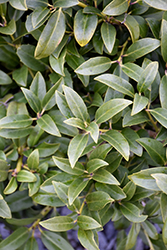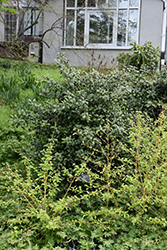It's all about ...
plants

Cherry Bomb Winterberry Holly
Ilex 'Cherry Bomb'
Height: 5 feet
Spread: 4 feet
Sunlight:
![]()
![]()
Hardiness Zone: 7a
Brand: Garden Debut
Description:
Large and abundant, bright red berries last throughout winter on this low growing dense shrub, and contrast its dark green, glossy leaves; vigorous and adaptable, it is good for problem areas; a great foundation planting or low hedge
Ornamental Features
Cherry Bomb Winterberry Holly is primarily grown for its highly ornamental fruit. It features an abundance of magnificent red berries from mid fall to late winter. It has dark green evergreen foliage which emerges light green in spring. The glossy pointy leaves remain dark green throughout the winter.
Landscape Attributes
Cherry Bomb Winterberry Holly is a dense multi-stemmed evergreen shrub with a more or less rounded form. Its average texture blends into the landscape, but can be balanced by one or two finer or coarser trees or shrubs for an effective composition.
This shrub will require occasional maintenance and upkeep, and is best pruned in late winter once the threat of extreme cold has passed. It is a good choice for attracting birds to your yard, but is not particularly attractive to deer who tend to leave it alone in favor of tastier treats. It has no significant negative characteristics.
Cherry Bomb Winterberry Holly is recommended for the following landscape applications;
- Accent
- Mass Planting
- Hedges/Screening
- General Garden Use
Planting & Growing
Cherry Bomb Winterberry Holly will grow to be about 5 feet tall at maturity, with a spread of 4 feet. It has a low canopy with a typical clearance of 1 foot from the ground, and is suitable for planting under power lines. It grows at a slow rate, and under ideal conditions can be expected to live for 40 years or more. This is a self-pollinating variety, so it doesn't require a second plant nearby to set fruit.
This shrub does best in full sun to partial shade. It prefers to grow in average to moist conditions, and shouldn't be allowed to dry out. It is very fussy about its soil conditions and must have rich, acidic soils to ensure success, and is subject to chlorosis (yellowing) of the foliage in alkaline soils. It is somewhat tolerant of urban pollution. Consider applying a thick mulch around the root zone in winter to protect it in exposed locations or colder microclimates. This particular variety is an interspecific hybrid.
This plant is not reliably hardy in our region, and certain restrictions may apply; contact the store for more information.

